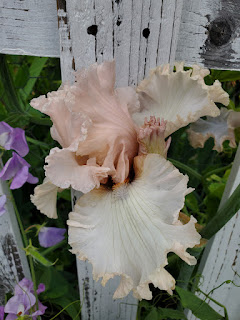To encourage irises to bloom, you can follow these guidelines:
Sunlight: Irises require at least 6 hours of direct sunlight per day to bloom properly. Ensure that they are planted in a location that receives adequate sunlight. If your irises are not blooming, it could be due to insufficient sunlight.
Soil and Drainage: Irises prefer well-draining soil. Amend heavy clay soil with organic matter, such as compost or aged manure, to improve drainage. Avoid planting irises in areas with poor drainage, as waterlogged soil can lead to rotting and poor blooming.
Fertilization: Irises benefit from regular fertilization to promote healthy growth and blooming. Apply a balanced fertilizer with a ratio such as 10-10-10 or 5-10-10 in early spring before new growth begins. Follow the package instructions for the recommended application rate. Avoid over-fertilizing, as it can result in excessive foliage growth at the expense of blooms.
Watering: Irises prefer moderate watering. Keep the soil evenly moist but not waterlogged. Water deeply when necessary, allowing the top inch of soil to dry between waterings. Avoid overhead watering, as wet foliage can increase the risk of disease.
Division: If your irises have become overcrowded and stopped blooming, it may be time to divide them. Divide the rhizomes every 3-4 years in late summer or early fall when the foliage has died back. Dig up the clumps, separate the healthy rhizomes, and replant them in well-prepared soil. Dividing irises can rejuvenate the plants and stimulate blooming.
Pest and Disease Control: Monitor your irises regularly for pests and diseases. Common issues include iris borers, aphids, and fungal diseases. Take appropriate measures if any problems are observed, such as applying insecticides or fungicides according to the instructions.
Mulching: Applying a layer of organic mulch around the base of the plants can help conserve moisture, regulate soil temperature, and suppress weed growth. However, avoid mulching directly over the rhizomes, as it can lead to rotting.
Winter Care: In colder regions, provide winter protection for irises. Mulch the plants with straw or leaves to insulate the soil and protect the rhizomes from freezing temperatures.
By following these tips, you can encourage your irises to bloom and enjoy their beautiful flowers. Keep in mind that different iris varieties may have specific requirements, so it's beneficial to research the specific type you're growing for additional care instructions.


No comments:
Post a Comment